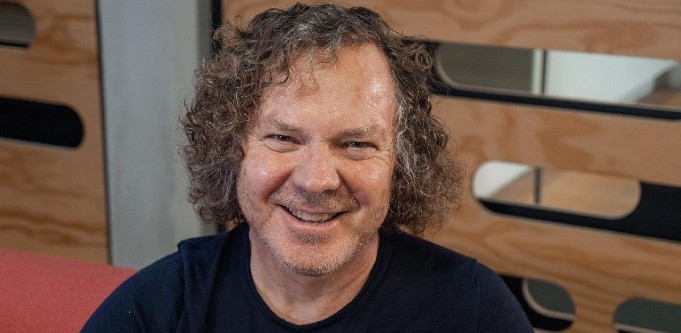
Soul Machines co-founder Greg Cross. Source: supplied.
New Zealand emotional AI startup Soul Machines has raised $US40 million ($58 million) in Series B funding, to boost research and development for its computer-generated customer support characters with ‘digital brains’.
The round was led by Singapore VC Temasek, and also included European VC Lakestar and Salesforce Ventures. Existing backers Horizon Ventures and the University of Auckland Inventors Fund also took part in the round, along with other, unnamed existing investors.
Soul Machines provides corporations with digital customer service assistants, or ‘digital superstars’, via video chat.
Speaking to StartupSmart, co-founder Greg Cross says the startup is working on the “new frontier of artificial intelligence”.
The team is working on making AI more human and easier to interact with, thereby making it easier for people to relate to and trust machines built on AI platforms, he explains.
A lot of research is focused on “how are we going to get more human intelligence into artificial intelligence?”
Soul Machines research has been looking into how to create what he calls a “digital brain”.
The technology means CGI characters can be autonomously animated, in the same way humans are.
“Everything could be interactive, everything could be completely dynamic.”
Ultimately, this means customers could have face-to-face interactions with a system. For large organisations, that means connecting and building trust, potentially with millions of consumers at a time.
“We communicate more effectively when it’s face-to-face interaction. We build relationships … we learn to trust people and the companies that those people represent,” Cross says.
“If you’re actually wanting to build a dynamic and positive customer experience, people tend to want to do that face-to-face.”

Fatema, a Soul Machines AI customer service assistant. Source: supplied.
Dollars and discipline
Co-founder Mark Sagar started working on the neuroscience research behind the technology back in 2012, in a research lab at the University of Auckland.
He and Cross launched the business in 2016, spinning it out of the university and securing an initial $US7.5 million in Series A funding.
At that time there were 12 people on the team. Now, the business has a headcount of almost 130, and while its R&D headquarters is still in Auckland, there are offices in San Francisco, LA, New York, London, Tokyo and Melbourne.
Cross expects to add additional offices in Europe and Singapore within the next 12 months.
“We would expect over the next 12 months to close to be doubling in size again,” he says.
And, while he doesn’t reveal exact figures, the co-founder expects average order revenue for 2020 to be “well over $10 million” as a ballpark figure.
“Managing that sort of growth and being successful at what we do requires a large number of really, really smart people, and quite a lot of focus,” he says.
That said, the majority of the funding is not earmarked for expansion. Instead, it’s going into R&D, and building on the company’s intellectual property.
Cross sees this as a discipline.
“That keeps me and my sales team very focused on funding the growth of the business from cashflows and revenues,” he explains.
“A big focus for this year is continuing to grow our revenues, and finding innovative new applications for our technology.”
On the big stage
Although Cross is a serial entrepreneur who has lived and worked in the US for much of his career, he says people still find it interesting that research at this level is being done in New Zealand.
“People expect deep AI research to come out of the US or Israel or the UK,” he says.
“People are often a little bit surprised that we’re doing such deep AI research in this part of the world.”
But, he stresses that the US remains the biggest market for software in the world.
“If you’re going to be successful with this sort of technology, you have to be successful in the US,” he says.
“There’s an element of presenting yourself in the same way as another company would present itself.”
Having an idea and building an interesting technology is one thing. Commercialising and finding a market for it is quite another, Cross explains. And, like it or not, your commercial strategy and your capital strategy will likely be closely coupled.
“You become more attractive to high-quality investors if you can prove to them that you understand how to compete and win and scale in a large, sophisticated market like the US.”
Finally, Cross advises entrepreneurs to stay curious, even when things aren’t going so smoothly.
“All startup entrepreneurs start with a dream or an idea. Not all of them turn into unicorns or multimillion-dollar or multi-billion-dollar companies,” he says.
“But there’s always something to be learnt from the journey that you’re on, at any point in time.”
NOW READ: Robot takeover: The wildest new tech from CES 2020
NOW READ: Kiwi startup Joyous raises $3.8 million to jump on “frankly massive” HR tech opportunity


COMMENTS
SmartCompany is committed to hosting lively discussions. Help us keep the conversation useful, interesting and welcoming. We aim to publish comments quickly in the interest of promoting robust conversation, but we’re a small team and we deploy filters to protect against legal risk. Occasionally your comment may be held up while it is being reviewed, but we’re working as fast as we can to keep the conversation rolling.
The SmartCompany comment section is members-only content. Please subscribe to leave a comment.
The SmartCompany comment section is members-only content. Please login to leave a comment.